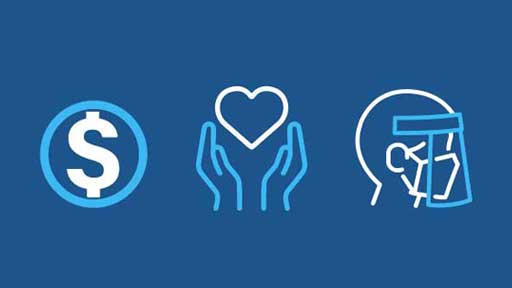
Credit score 101
Your credit score is a three-digit number that serves as an indicator of your creditworthiness and financial responsibility. Your credit score can range from a “poor” 300 to an “excellent” 850. The score is calculated through a variety of factors, including your credit utilization, payment history, outstanding debt, types of credit and history of credit. The higher your score, the easier time you’ll have getting approved, and the lower the interest rates you’ll be offered.
Discover the best ways to build and maintain an excellent credit score.
Pay your bills on time
Paying your bills when, or even before, they’re due is a major factor in your score. Repeatedly missing your payments or continuously carrying a large outstanding balance can suggest that you can’t be counted on to responsibly repay loans. To ensure you never miss a payment, set up automatic monthly payments for your bills with Bill Pay. You can also set up a direct deposit to make sure you have funds in your account to pay your bills on time. Payroll direct deposits for MSGCU members will also be in accounts up to two days early, provided the funds are received from employers, which gives early access to funds, helps prevent overdrafts before they occur, and gives a few extra days for bill payment deadlines.
Have active credit cards and a healthy credit mix
Building and preserving a healthy credit score requires having credit to begin with, which can mean owning a few cards and keeping them active, as well as having other types of credit such as an auto loan or student loan. If you’re just starting out, consider signing up for a beginner’s card, which generally features easy eligibility requirements and very little available credit. Whether you prefer a credit card with the lowest rate, or one that rewards you for every purchase, you'll find that all of our cards come with the friendly features you've come to expect from MSGCU.
Work on paying down debt
Showing the credit bureaus that you’re on track to pay off your debt can do wonders for your score. Choosing a debt-crushing method might be the answer. The snowball method works by putting all available funds toward paying off the lowest debt first, and then the next-smallest, until all debts are paid off. The avalanche method works the same way but focuses on paying off the highest interest rate debts in descending order until all are paid off. With the snowball method, you’ll get faster results, but may end up paying more in overall interest payments on all debts. Use the method that works best for you.
Bring down your credit utilization ratio
Another crucial factor in your score, your credit utilization ratio, refers to the amount of available credit you use. Keep your utilization under 30%, or even 10% each month if you can. In addition, consider accepting offers for increased credit – as long as you know you won’t rack up huge bills simply because of having all that credit.
Monitor your credit often
The only way to know if what you’re doing is helping or hindering your credit score is to stay on top of it. MSGCU’s Credit Score is free and easy to use. Available within Online and Mobile Banking, Credit Score allows you to access your credit score whenever you want. It allows you to set goals and will provide recommendations to improve your credit score. Credit Score is a “soft inquiry” or sometimes called a “soft pull” which does not affect a credit score. The best part is that you can conveniently view your credit score, see your credit report, and more 24/7.
Building and maintaining a good credit score is important for your financial wellbeing. Be sure to use the tips outlined here, take advantage of our free, one-on-one financial counseling available at every branch office, attend a MSGCU workshop or use Credit Score to regularly monitor your credit.
Category: Finance
« Return to "Blog"





































































